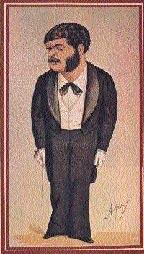
With second term’s play Gilbert Without Sullivan recently completed, shortly to be followed by The Mikado, the interested public at large can read on for a bit of background information about Arthur Sullivan.It was Jan. 1884, and Arthur Sullivan was facing a personal crisis: he no longer desired to write music for the comic operas that had brought him fame and fortune. At the age of 42 he had already achieved huge success in collaborations with W. S. Gilbert and had even been recently knighted by Queen Victoria. Gilbert and Sullivan’s works had found a permanent and continuous home in London at Richard D’Oyly Carte’s Savoy Theatre. Their considerable body of work was exceedingly popular, and it had become a genre in its own right. Both librettist and composer were under pressure to produce another hit.
Sullivan was having doubts as to whether he was using his talents in the right way. After all, the composers that he respected most worked in the high language of symphonies and songs, cantatas and madrigals, and certainly not in anything so light as operetta.
There can be no doubt that from very early in his life Sullivan set his sights on being a decidedly serious composer. His father was a bandmaster at the Royal Military College, so young Arthur was surrounded by music and musicians from his earliest days. At the age of twelve he was accepted as a choirboy at the Chapel Royal and went on to study at the Royal Academy of Music and later Leipzig Conservatory. Incidental music that Sullivan composed for Shakespeare’s Tempest was well received by the London public in 1862, and two years later (at the age of twenty-four) he heard a performance of his first (and only) symphony in the Crystal Palace. The symphony was well received by both common person and press: a repeat performance some months later drew applause after every movement and inspired The London Times to call it “the best musical work.for a long time produced by any English composer.”
So how does a man so seemingly set for a successful life of dire seriousness become one of the leading composers of what must be one of music’s least serious incarnations? It’s for the same reason that there are more composers writing movie scores than oratorios today: a composer, no matter how devoted to high ideals and great forms, still has to find some way to eat. In the early days Sullivan was forced to work several jobs. He worked as a church organist, as an amateur choral society conductor, and as a teacher to make ends meet.
By the late 1870s, however, Sullivan had been transformed from the aspiring serious composer trying to make ends meet to the fashionable society man who frequented London’s swanky gentlemen’s clubs and moved in the same circles as the Prince of Wales. The light-hearted musical dramas that Gilbert and Sullivan had written- Trial by Jury, Pirates of Penzance, and H.M.S. Pinafore, just to name a few-were hugely successful with a Victorian public that sorely needed something witty and whimsical in their lives. (Over seriousness was truly endemic in Victorian England.)
While the glamour and prestige that accompanied his accomplishments surely pleased Sullivan, he continued to question whether he was using his talents wisely. After having a relative failure in early 1884 with Princess Ida, an operetta that harshly mocked the idea of women seeking higher education and was the theatrical embodiment of pretty much everything Virginia Woolf argued against in A Room of One’s Own some fifty years later, Sullivan was less than enthusiastic about continuing with the collaboration. He demanded that Gilbert produce a libretto with real human emotion and less nonsense than had been his trend. At the time Gilbert was completely enamored with writing a new libretto based on the idea of a magic cough drop (yes, really) that could change a person into anything that person desired.
The story could have ended there with Gilbert and Sullivan going off in different directions. Happily, Gilbert was hit by the sudden idea (supposedly inspired by a Japanese executioner’s sword falling off the wall of his study) to write an operetta with an oriental theme. Sullivan, somewhat worn down in his convictions after listening to several weeks of pleading from both D’Oyly Carte and Gilbert, was happy to hear of any plot that didn’t involve transfiguring cough drops, and agreed to rejoin the company. On March 14, 1885 The Mikado was first presented at the Savoy to rave reviews. It would run for an amazing 672 performances at the Savoy and was considered by many at the time be Gilbert and Sullivan’s greatest work-an opinion which is still widely held today.
As to the issue of whether musical drama is in some way inferior in importance to traditionally serious forms of music, it is a question that Sullivan struggled with until his death in 1900, and a question that would be on the minds of many composers trying to make in a living in the changing world of the twentieth century. Countless Gilbert and Sullivan devotees from around the world, however, possess no doubt as to Sullivan’s greatness.
Perhaps George Bernard Shaw put it best in an unsigned Sept. 1890 article for The Scots Observer when he said of Sullivan, “They trained him to make Europe yawn; and he took advantage of their teaching to make London and New York laugh and whistle.
